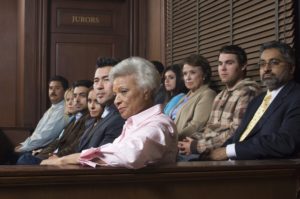What You Need to Know about Jury Trials
Posted September 27th, 2017 by Anthony Carbone, PC.
Categories: Legal Topics.

If you’re like most people, you’re worried about your day in court. Of course, you may not be entirely sure how you feel about a jury trial. You might even envision a bunch of strangers huddled in a room like a scene out of 12 Angry Men.
Hollywood may be only one source of your trepidations regarding a jury trial. Be that as it may, you could be surprised to learn that your case won’t be heard by a jury. Should one person just decide your fate or the outcome of your lawsuit? How does this all work anyway?
Are All Cases Heard by Juries?
It might be something you already know. However, it bears repeating and clarification. In New Jersey, not all cases are heard by juries. Instead, a judge may be asked to make determinations based on the evidence presented, findings of facts, and interpretation of the law.
When a judge alone decides a case, it is called a bench trial. Let’s take a look at the kinds of matters that do not require or permit the case to be heard by a jury:
- Municipal court cases, including DWI charges where there were no injuries or fatalities, traffic offenses, and simple assault charges
- Juvenile court matters
- Workers’ compensation cases
- Family law matters, including divorce, custody, restraining orders, and adoptions
- Landlord/tenant cases
- Collections matters
- Chancery and probate cases
Truth be told, you may think there is no rhyme or reason to the cases where a judge decides the case instead of a jury. In some, it’s a matter of expediency. For others, it’s concerns about confidentiality. Suffice it to say, the dreaded phrase that “it is what it is,” applies to this situation.
Juries and the Types of Cases They Hear
By now, you may be wondering what’s left when it comes to jury trials. For starters, all criminal matters heard in state or federal court go before juries. You may also hear state court called the New Jersey Superior Court. Some people refer to Superior Court matters according to the county where the judges preside. For example, the New Jersey Superior Court that hears Hudson County cases is located in downtown Jersey City. When someone says their lawsuit is being tried in Hudson County, they are still referring to state court.
In the meantime, jurors may be impaneled to make determinations about certain civil matters. They include the following types of lawsuits:
- Motor Vehicle Crashes
- Bus Accidents
- Truck Accidents
- Premises Liability Matters
- Slip and Fall Cases
- Medical Malpractice Lawsuits
- Products Liability Matters
- Wrongful Death Cases
Whether your case is a criminal or civil matter, your attorney can tell you if the trial will be a bench or jury trial. As far as civil cases, you should know that most cases are settled before going to court.
The Jurors
Without question, you may have concerns about the jurors. You should know that the jury pool is intended to come from other residents within your particular jurisdiction. The goal is to select individuals who are considered your peers.
In selecting the jury, attorneys representing all parties will engage in the voir dire process. This involves asking questions to determine whether or not a prospective juror may have particular biases that could affect the outcome of the case. Ultimately, the goal is to start with jurors who can be impartial and come to conclusions as fairly as possible.
During the process of seating the jury, your attorney will have the opportunity to challenge or ask that individual jurors be excused. Jury selection is a strategic undertaking and crucial to your case.
How many jurors will hear your case? In most civil lawsuits, six jurors may be assigned to listen to the facts of the matter. However, in some civil trials, twelve will be selected. In criminal trials, twelve jurors are impaneled to the case. You can learn more about jurors by looking at this section of the New Jersey Courts website.
Ultimately, the judge will provide instructions to the jury concerning the case. These guidelines are essential to the deliberation of the matter.
Contact Us
At the Law Offices of Anthony Carbone, we have represented clients in both criminal and civil court. Our experience has helped in our deliberate approach to selecting jurors. Have questions? Contact us to see how we can assist you.


